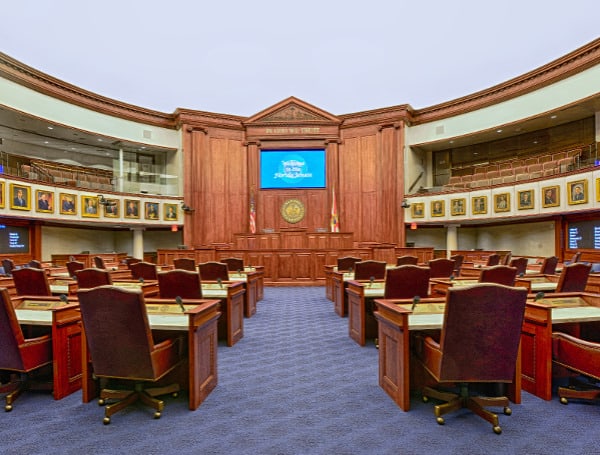Just two weeks into the 2023 legislative session, the Florida House is making quick work of high-profile bills, including one that could result in the state’s largest-ever expansion of school voucher programs.
The Republican-dominated House on Friday passed its version of the voucher measure (HB 1), while Democrats slammed the expansion as a “coupon for millionaires.”
Opposition to the bill centered, in part, on eliminating income-eligibility requirements that are part of the state’s existing voucher programs. Under the new plan, families would be eligible to receive vouchers if “the student is a resident of this state and is eligible to enroll in kindergarten through grade 12 in a public school in this state.”
The bill would make another significant change to the state’s voucher system by allowing families of home-schooled students to receive the funds. The measure would set up what are known as “education savings accounts” in Florida. The accounts would allow recipients to spend the funds on a range of purchases beyond private-school tuition, such as instructional materials and tutoring services.
In the news: House Republicans Gather Florida Parents’ Input Ahead Of Education Bill Vote
House Speaker Paul Renner, R-Palm Coast, made the voucher expansion a major priority for the 60-day legislative session.
“This bill … will forever change the course of education in Florida. It allows for customized education for each and every child in this state,” Renner said after the House passed the bill Friday.
But Rep. Marie Woodson, D-Hollywood, echoed many other opponents when she criticized the possibility that wealthy families would receive vouchers.
“This bill is an $8,000 gift card to the millionaires and billionaires who are being gifted with a state-sponsored coupon for something they can already afford,” Woodson said.
The Florida Education Association teachers union also derided the measure as providing an “$8,000 taxpayer funded coupon for millionaires and billionaires,” saying in a tweet that the measure is a “terrible idea.”
On St. Patrick’s Day, when many in the Capitol wore green to avoid being pinched, a disagreement persisted over how many greenbacks the voucher proposal could cost the state.
In the news: Florida Gov. Ron DeSantis Highlights Recovery Efforts Following Hurricane Ian
House and Senate staff analyses have offered different estimates, with the House giving a ballpark estimate of $209.6 million, while a Senate analysis estimated a price tag of roughly $646 million.
But the Florida Policy Institute, a non-profit group that opposes the voucher plan, estimates that the proposal would cost about $4 billion.
House sponsor Kaylee Tuck, R-Lake Placid, defended the bill against concerns about its potential costs.
“We’ve heard a lot today about the dangers and the economic concerns that come with opening up eligibility to everyone. But I posit you this, we should be empowering every single family and every single child,” Tuck said.
The full Senate could consider a similar bill (SB 202) as early as next week.
TORT REFORM HURTLES AHEAD
The House also on Friday passed a high-profile measure that seeks to shield businesses and insurance companies from costly lawsuits.
The plan includes largely eliminating what are known as “one-way” attorney fees in lawsuits against insurers. One-way attorney fees have long required insurers to pay the attorney fees of plaintiffs who are successful in lawsuits.
In the news: D.C. Based Group Files Public Records Request Lawsuit Against Florida Department Of Education
Rep. Tommy Gregory, a Lakewood Ranch Republican who is helping sponsor the House version (HB 837), said Thursday the plan would bring “balance” to a system plagued by excessive litigation.
“This bill is decades in the making and long overdue, as Floridians have been forced to pay more for food, clothing, shelter and, yes, insurance for both their automobiles and their homes,” Gregory said as the House prepared the bill for Friday’s vote. “This is because the civil justice system in Florida is out of balance.”
But critics said the plan is tilted too far toward insurers at the expense of injured people, who will face new roadblocks in pursuing lawsuits over negligence. They also said it will not lower insurance rates.
“Floridians will not see lower insurance premiums as a result of this legislation,” Rep. Hillary Cassel, D-Dania Beach, argued. “This legislation does not include any requirement that they (insurers) reduce their premiums. … And let me tell you, these insurance companies are not going to let go of their premiums. What they’re going to do is they’re going to hold onto the money, and now your constituents are not going to be able to hold them accountable.”
The plan also cleared its final Senate committee Thursday.
Speaking to reporters after the floor session, Renner referenced the vouchers and tort-reform bills passing and called Friday a “super historic day.”
“I can’t think of a single day in regular session where we’ve had two bills pass that were so transformational,” Renner said.
In the news: Rep. Steube Secures U.S. Coast Guard Guarantee To Readmit Wrongfully Disenrolled, Unvaccinated Cadets
ABORTION BILL GET TRACTION
After lawmakers passed a 15-week limit last year, the House on Thursday started moving forward with a proposal that would prevent abortions after six weeks of pregnancy.
The GOP-controlled House Healthcare Regulation Subcommittee voted 13-5 along party lines to approve the proposed restrictions (HB 7) after hearing often-emotional testimony about issues such as women’s health and pregnancies caused by rapes.
Bill sponsor Jenna Persons-Mulicka, R-Fort Myers, said the measure “promotes life” and supports families.
“It’s a bill that recognizes the importance and value of the life of innocent, unborn human beings,” Persons-Mulicka said.
But Rep. Christine Hunschofsky, D-Parkland, called the bill a “de facto abortion ban” and said it fails to take into account different circumstances that women face when they become pregnant.
“We talk about being a free state, and this is literally the antithesis of that,” Hunschofsky said.


